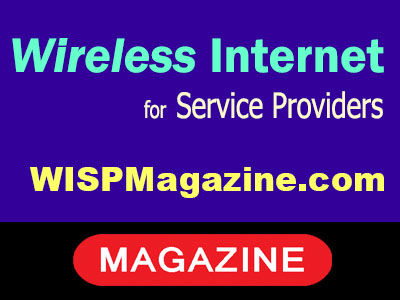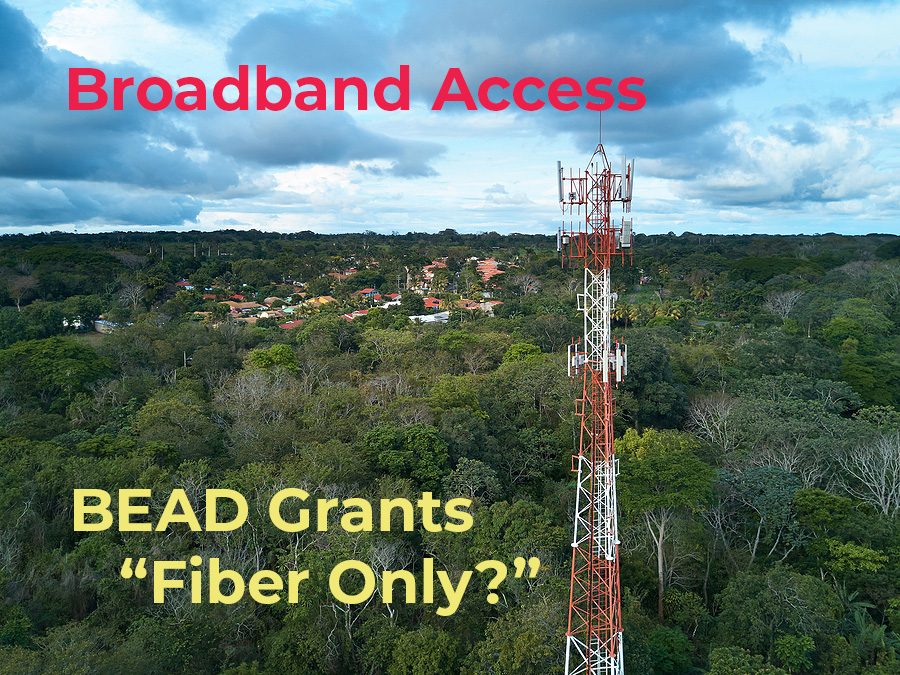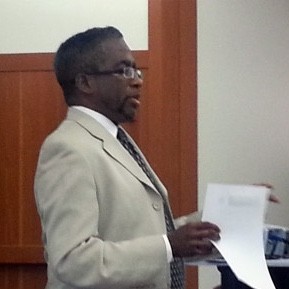By: Craig Settles
The United States is on the brink of its most significant investment in broadband, the $42.5 billion Broadband Equity, Access, and Deployment (BEAD) grant program that’s administered by NTIA. The money is good, but there’s a fly in the ointment. NTIA has a fiber-first policy, meaning, unlicensed fixed wireless access (FWA) likely I make it more difficult to get funded.
Reminds me of a poem, “For want of a nail the shoe was lost. For want of a shoe the horse was lost.” By downplaying fixed wireless, could we have the unintended consequence of compromising BEAD’s success? In an ideal world, federal and state agencies at the very least would swap these two sentences for the NTIA’s errant “fiber-first” (code for ”fiber-only”) policy:
The BEAD mission is to get as many residents as money allows so residents get connected to the Internet at speeds as close as possible to 100/20 Megs per second. On this mission, use whatever technologies that communities deem appropriate and effective to meet their respective broadband needs, including fixed wireless.
Unfortunately, NTIA’s reported position on BEAD is that, “Any fully unlicensed networks will not be considered a ‘reliable broadband network’”. Really?! How can NTIA deem FWA as “not reliable” while simultaneously giving millions of dollars to projects comprised entirely of FWA? And there’s still the danger that a WISP already is providing 100/20 wireless, for example, and their customers are happy, yet NTIA could allow a fiber provider to overbuild that WISP because – well– the wireless is “unreliable.”
NTIA awarded $87 million in 12 Tribal Broadband Connectivity Program (TBCP) grants. “If those networks are considered ‘reliable’ for the purposes of TBCP grants, then they should be ‘reliable’ for the BEAD purposes.” says Louis Peraertz, Vice President of Policy for the Wireless ISP Association.
“Clearly NTIA knows that it’s fast, it’s reliable, and they believe in it, or they wouldn’t have recently awarded us $20 million for our entirely unlicensed FWA project that covers multiple Pennsylvania counties,” says Dwayne Zimmerman, Founder of Crowsnest Broadband LLC. “We secured an award from the NTIA Broadband Infrastructure Program to serve 7,261 unserved households.”
Even Wi-Fi is reliable for secure communications. Derek Underwood, North American Regional Vice President for Cambium Networks observes, “Every single hospital in the country that I’m aware of has a Wi-Fi network that carries sensitive, mission-critical data throughout that hospital. That doctor is inputting your medical information on a tablet that’s connected to an access point. Wireless is good enough for us when we’re inside the hospital but it’s not reliable to provide Netflix streaming at home? To me, this doesn’t make sense.”
Cleveland Shows the Value and Virtue of Fixed Wireless
Actually, no one should be surprises about the “fiber-only” policy. From the beginning of BEAD, large incumbent and their lobbyists have been doing everything possible to stifle competition, including pushing a “fiber-first” policy. This policy stifles the kind of broadband competition that Cleveland, Ohio is bringing to bear with its citywide fixed wireless network that will deliver 100 Megs symmetrical to low-income communities for just $18/month.
DigitalC, a nonprofit Cleveland-based WISP, rallied the political and community stakeholders together to support the broadband vision. DigitalC’s nonprofit status helped it win the bid against AT&T, Spectrum, and T-Mobile. Don’t be disappointed if your state legislature has fiber myopia. The Ohio state legislature passed a fiber-only bill for BEAD, but Ohio governor Mike DeWine added $10 million to the $50 million DigitalC collected in total.
Cleveland and DigitalC are in a different situation than many of the potential BEAD applicants. But there is one definite situation that the city shares with the rest of those communities – incumbent headwinds. Cleveland had to battle AT&T’s digital redlining practices. There likely will have more battles to fight. JJ McGrath, President of TekWav, a Texas WISP says, “Many of you are fighting a fierce fiber lobbying effort. You’re fighting that marketing machine, that corporate education machine. You have to be relentless!”
Advice from the Trenches
Fixed wireless capabilities are powerful! WISPs and small ISPs have to preach the gospel. “We’re selling one manufacture’s first-generation product that delivers 300 Meg download, 100 Meg upload,” preaches Zimmerman. “Each radio attached to a tower has seven or eight gigabits of aggregate capacity per radio. You can put four or eight of them up on a tower. We’ve got 100 gig, 40 gig, 25 gig backbone and 10 Gig transport circuits.” Lead from a position of strength.
Smaller companies such as WISPs have a disadvantage and it’s a challenge getting BEAD money. McGrath says, “There’s no ‘future-proof,’ but that’s a good buzzword to hide the fact that we are in a pay-to-play system. With incumbents, it’s often about lobbying and positioning and posturing. Set realistic expectations. Partner with your state broadband office. Ours office is aggressively helping a lot of ISPs, especially smaller ISPs. I’ve positioned the company in a way so we can fight in the unlicensed or the license space or in the fiber rounds.”
Paul Narro, Director of Public Policy at TekWav, continues, “We have been highly engaged with our broadband office [the Texas Broadband Development Office] since Day 1, and we’re trying to help them out as much as possible. The office was created in 2001 and there’s a lot to do in a short period of time. We know some things that are probably going to happen with regards to these BEAD rules. Their staff is open to hearing new ideas and receptive to a lot of the advice we’ve given them.
Don’t just tell ‘em – show ‘em. “I’ve taken it upon our team to educate Pennsylvania’s broadband office about our WISP and about wireless,” says Zimmerman. “Just a few weeks ago we had their Executive Director and Deputy Secretary [of Pennsylvania’s Broadband Office] out to visit us. We went around to some customers, we set up an antenna and showed them how it works, and we did some speed tests for them. They’re beginning to understand that they don’t want to overbuild this fixed wireless stuff because it works great. They saw me do a 400-meg speed test in the middle of nowhere – through trees!”
Craig Settles assists cities and co-ops with business planning for broadband, as well as showing how telehealth can drive broadband adoption. In December, he wrote “Be All You Can BEAD”, which presents community stakeholders with an overview of why fixed wireless is technology needed in the BEAD program, and how communities can combine wireless and fiber to be greater than the sum of the parts.


